- Home
- Nancy Mitford
Christmas Pudding and Pigeon Pie Page 2
Christmas Pudding and Pigeon Pie Read online
Page 2
Paul Fotheringay sat in his Ebury Street lodgings looking at the presentation copies of his book, Crazy Capers, which had just arrived by post. He thought of the lonely evening ahead of him and wondered whether he should telephone to some of his friends, but decided that it would be of little use. They would all be doing things by now. He also thought of the wonderful energy of other people, of how they not only had the energy to do things all day but also to make arrangements and plans for these things which they did. It was as much as he could manage to do the things, he knew that he would never be able to make the plans as well. He continued sitting alone.
Walter Monteath was playing bridge with three people all much richer than himself. He was playing for more than he could afford to lose and was winning steadily.
Sally Monteath was trying on a dress for which, unless a miracle happened, she would never be able to pay. She looked very pretty in it.
Marcella Bracket was ringing up a young man and hinting, rather broadly, that he should take her out that evening.
Amabelle Fortescue was arranging her dinner table. She wondered whether to put a divorced husband next to his first wife, and decided that it would be a good plan; they always got on famously with each other now that this was no longer a necessary or even a desirable state of things.
Jerome Field slept in his office.
Miss Monteath, nameless as yet, slept in her pram.
Bobby Bobbin, at Eton, was writing a note to an older boy.
Philadelphia Bobbin sat in her mother’s drawing-room and looked at the fire. She hoped that death would prove less dull and boring than life.
Lady Bobbin tramped Gloucestershire mud and cursed the foot and mouth disease which had stopped the hunting that beautiful, open winter.
‘I loved thee in life too little, I loved thee in death too well,’ sang Lord Leamington Spa at a concert in aid of the Jollier Villages Movement. Later on he sang ‘Fearful the death of the diver must be’, and for an encore, ‘Under the deodar’. Lady Leamington Spa agreed with the chairwoman of the movement that her husband had a charming voice. ‘Our son is musical like his father,’ she said proudly.
Squibby Almanack, the said son, sat with the three fair and slightly bald young men who were his friends at a Bach concert, in Bond Street.
Major Stanworth drove his Morris Cowley along the high road between Oxford and Cheltenham. He was on his way to the preparatory school where his little boy was having mumps rather badly.
Michael Lewes was sending out invitations for a garden party at H.B.M. Residency, Cairo. He thanked heaven several times aloud that he was leaving the diplomatic service for good at Christmas.
The Duchess of St. Neots was talking scandal with an old friend. Any single one of the things she said would have been sufficient to involve her in an action for criminal libel. Her daughter by a former marriage, Miss Héloïse Potts, was listening from an alcove where she very much hoped to remain undiscovered.
Sixteen characters in search of an author.
1
There is a certain room in the Tate Gallery which, in these unregenerate days, is used more as a passage-way towards the French pictures collected by Sir Joseph Duveen than as an objective in itself. There must be many lovers of painting who have hurried through it countless times and who would be unable to name or even to describe a single one of the flowerings of Victorian culture which hang there, so thoroughly does the human mind reject those impressions for which it has no use.
Indeed Paul Fotheringay, until, on the second day of November, he found himself sitting in this room, had been unaware of its very existence. He now observed that it was mostly hung with large and unpleasant works of the ‘Every picture tells a story’ school, interspersed with some rather inferior examples of pre-Raphaelitism and a few careful drawings by Ruskin. He sat on a hard and shiny bench and gave himself up to the contemplation of an elderly lady who was struggling, with but little success, to reproduce the handsome but unprepossessing features of Mrs. Rossetti. For it was copying day in the Tate. Paul wondered how she managed to keep the paint so beautifully smooth. He thought it very clever of her. Whenever he had tried to express himself on canvas, the result had invariably been a mass of dirty bumps; his own particular style of course, and, he liked to think, a not unpleasing one. Nevertheless, he was perfectly aware that even if he wished to do so he was incapable of producing that oleographic smoothness which seemed to come so easily to the elderly copyist.
Soon, however, his thoughts left the exterior world and turned upon his own inward wretchedness. When a man is harassed beyond endurance through the two most important aspects of life; when the labour of months bears a bitterer fruit than that of failure; and when, at the very same moment, she whom he adores shows herself once and for all unworthy of adoration; then indeed is that man unhappy.
So thought Paul; and writhing beneath the duplicated gaze of Mrs. Rossetti he considered for the hundredth time the two causes of his present depression, namely, the behaviour of his fiancée, Marcella Bracket, and the reception by the public of his first novel, Crazy Capers, which had been published that week. It would be difficult to say which was the more wounding. The reception accorded to his novel, indeed, appeared at first sight to have been extremely gratifying. The critics, even those of them who had been neither at Eton nor at Oxford with him, had praised it extravagantly, and with a startling unanimity; the cheque which he would eventually receive from his publisher promised to be a great deal larger than those which must so often (and so fortunately) prevent young authors from ever again putting pen to paper. The book, in fact, was an undoubted success. Nevertheless how could praise or promise of glittering gain compensate in any way to the unhappy Paul for the fact that his book, the child of his soul upon which he had expended over a year of labour, pouring forth into it all the bitterness of a bitter nature; describing earnestly, as he thought, and with passion, the subtle shades of a young man’s psychology, and rising to what seemed to him an almost unbearably tragic climax with the suicide pact of his hero and heroine, had been hailed with delight on every hand as the funniest, most roaringly farcical piece of work published for years. He who had written with one goal always before him, sincere approbation from the very few, the exquisitely cultured, was now to be held up as a clown and buffoon to jeers and senseless laughter from the mob.
His eyes, fixed upon Lizzie’s face, filled with tears, so that her features became blurred and her hair more woolly than ever, as he recalled with a sinking heart that one critic after another had described him as the new humorist and his book as the funniest of the month. Sadly he drew from his pocket a sheaf of press cuttings. He knew them by heart already, and to look at them again was like pressing upon the tooth that aches in the hope that after all it perhaps does not ache unbearably.
REALLY FUNNY BOOK BY NEW WRITER
A welcome contrast to the unrelieved gloom of Miss Lion’s Tragedy in a Farmyard is provided by Paul Fotheringay, whose first novel, Crazy Capers, is the most amusing piece of work to be published for many months. This delicious whimsy maintains a high level of humour throughout, and should certainly find its way to the bookshelves of those who enjoy a quiet chuckle.
AMUSING FIRST NOVEL
… I myself paid Mr. Fotheringay the very sincere tribute of laughing out loud several times over the absurd adventures of his hero, Leander Belmont.… If Crazy Capers bears little or no relation to the experiences of actual life, one cannot but be grateful to its author for such a witty fantasy.
EX-UNDERGRADUATE’S DÉBUT AS HUMORIST
Paul Fotheringay’s first novel, Crazy Capers (Fodder & Shuttlecock, 7s 6d.) is one of the most entertaining books which it has ever been my good fortune as a reviewer to read. It reminded me sometimes of Mr. Wodehouse at his funniest, and sometimes of Mr. Evelyn Waugh at his most cynical, and yet it had striking originality. I could scarcely put it down, and intend to re-read it at the earliest opportunity. Crazy Capers is the story of a penniless
young aristocrat, Lord Leander Belmont, who on leaving Oxford with a double first is unable to find any career more suited to his abilities than that of a pawnbroker’s assistant.… Lord Leander is an intensely funny character, and so is his fiancée, Clara. The last chapter, in which they attempt to commit suicide by drowning themselves in the Thames, but are unable, owing to the vigilance of the river police, to achieve anything more tragic than a mud bath, is in particular a masterpiece of humour. I laughed until I was literally driven from the room.…
With great bitterness Paul remembered how he had written that last chapter, working through the night until he felt that he had arrived at that exact blend of tragedy and pathos for which he searched. As he wrote, the tears had poured down his cheeks. The frustration of two souls, battered beyond endurance by circumstances over which they had no control, unable even to make good their escape from a world which now held nothing for them, had seemed to him a noble, beautiful and touching theme. And nobody else had even remotely apprehended his meaning, not one person.
Putting the press cuttings back into his pocket he pulled out of it a letter which turned his thoughts towards an even more painful subject.
‘PAUL DARLING (it ran)
‘How sweet of you to send me a copy of Crazy Capers – I was perfectly thrilled at the dedication, it was indeed a lovely surprise. I hope it will be a wild success, it certainly deserves to be, personally I couldn’t have thought it funnier. I roared with laughter from beginning to end. I never knew you were capable of writing such a funny book. Must fly now, my sweet, as I’m going out with Eddie, so all my love and lots of kisses from
‘MARCELLA.
‘P.S. – See you sometime soon.’
Paul sighed deeply. That the girl whom he so distractedly adored had thus mocked his book was a wound indeed, but not a death blow; he had never, if the truth be told, entertained a very high regard for her mind. It was her unkind and neglectful conduct towards his person that was causing him so much unhappiness.
Considering her youth (she was twenty-two), Marcella Bracket had all the worst characteristics of the lion hunter developed to an extraordinary degree. She belonged to that rare and objectionable species, the intellectual snob devoid of intellect. Poets and painters were to her as earls and marquesses are to the ordinary snob; the summit of her ambition was to belong to what she considered a ‘highbrow’ set of people, to receive praise and adulation from the famous. Unfortunately for her, however, whilst knowing through her parents several earls and marquesses, she had not as yet managed to scrape even the most formal acquaintanceship with any great man of letters, nor had the only artist of merit to whom she was ever introduced been at all insistent that he should paint her portrait. Therefore, when poor Paul fell in love with her, which he did for some unaccountable reason at first sight, she saw in him a promising bottom rung to that particular ladder of social success which it was her ambition to climb. She even allowed him to think that they were unofficially engaged in order that she could go about with him, meeting his friends, nearly all of whom were people she had long wished to know, and at the same time picking up from him certain clichés and ideas that might be regarded as a passport to that society of which she hoped to become a member. In time, of course, she intended to marry some rich and colourless man so that she could settle down in Chelsea – a hostess; meanwhile it pleased and flattered her to feel herself the object of hopeless passion in one who had already a certain reputation for brilliance amongst the younger people.
Paul, who although he suspected something of this, only partly apprehended the situation, and moreover thought himself very much in love, was constantly plunged into a state of gloom and depression by her treatment of him. That very day, thinking thus to buy her company for the afternoon, he had invited her to luncheon at the Ritz, a luxury which he could ill afford. He had arrived there, admittedly a few moments late, to find that she was accompanied by the mindless body of Archibald (‘Chikkie’) Remnant. They were drinking champagne cocktails. When Paul appeared she hardly threw him a word, but continued to gossip with this moron for at least twenty minutes, after which ‘Chikkie’, having thrown out several unheeded hints that he would like an invitation to lunch, strolled away leaving Paul to pay for his cocktails. The meal which ensued gave him very little satisfaction; Marcella proved to be in her most irritating mood. In the intervals of ordering all the really expensive items on the menu, for it was one of her principles in life that the more you make people pay the more you can get out of them in the end, she chattered incessantly about her success with various young men unknown to Paul. He gathered that, so far from it being her intention to spend the afternoon with him, she had planned to leave him the moment that lunch was over and go down to Heston for a flying lesson with another admirer. The feeling that he was so soon to lose her from his sight again made him cross and restless, and he was almost glad when she did finally depart in a large Bentley for her destination of loops, spins and jupiter wapities. He knew quite well that by now an aerial flirtation would be in progress, for Marcella was an inveterate flirt.
Meanwhile he had come to Millbank for consolation, only to discover, as so many must have done before him, that there is in good art a quality which demands contentment if not happiness in its observer, its very harmonies serving but to accentuate disharmonies within. On the other hand, contemplation of the second-rate, by arousing the mind to a sort of amused fury, can sometimes distract it a little. Hence Mrs. Rossetti. Paul felt, however, that his present unhappiness was too deeply seated to be much shaken, and that even time would be powerless against such a situation as his. There seemed to be no hope, no ray of comfort. The career for which he had longed from childhood, that of a writer, was evidently closed to him; he never wished again to face a chorus of praise uttered in such lack of comprehension. Nor could his affair with Marcella come to any more satisfactory conclusion, for although he loved her, he knew that he would always dislike her.
The copyist now came down from her high stool and began to pack up. Lights appeared, making the place look more dismal than before, and a little fog seemed to have penetrated, although outside the day had been clear and beautiful. Paul’s thoughts returned to his present surroundings. He looked at his watch, which had stopped as usual, and decided that he would go home. Marcella might telephone, in which case he would like to be there – his landlady was bad at taking messages. He rose to his feet, and was about to wander towards the door when he noticed the unmistakable figure of Walter Monteath hurrying through the Turner room on his way, no doubt, to the French pictures. He looked round on hearing his name, and catching sight of Paul, said:
‘Hullo, old boy, fancy seeing you here. I am pleased. Sally and I have just laughed ourselves ill over your book by the way; it is heavenly. Those policemen! Honestly, my sides ached. And the pawnbroker was divinely funny too. How did you think of it all? I’d give a lot to write a book like that, everyone’s talking about it. Well, and where are you off to now?’
‘I don’t know,’ said Paul, trying to look pleased at this praise. ‘What are you doing? Can’t we have a drink somewhere?’
‘Yes let’s. As a matter of fact, I’m just on my way to Amabelle’s for a cocktail, so why don’t you come along too. I know she wants to see you; she was asking about you only yesterday. If you don’t mind waiting a moment while I have a look at the Puvis we’ll go straight away. I’ve got a car outside; for once it’s not being repaired at the works.’
Whilst Walter, who apparently was going to write an article on Puvis de Chavannes, was examining the picture of John the Baptist, Paul gazed at the large Manet and wished he were dead. He felt, however, that like the hero of his own book, he would be too cowardly and ineffective to achieve a satisfactory suicide; he was no Roman soldier to lean upon his sword.
Presently, as they drove towards Mrs. Fortescue’s house in Portman Square, Walter said, shouting to make himself heard above the twitterings, groanings and squeakings of his anc
ient motor car:
‘Sally and I met your Marcella last night; she was out with that poor mut Remnant and they joined our party later. We thought she was rather a dreary old do. Whatever do you see in her, Paul?’
‘Heaven knows,’ said Paul, drearily.
2
Amabelle Fortescue, unlike so many members of her late profession, was an intelligent, a cultured and a thoroughly nice woman. The profession itself had, in fact, been more a result of circumstances than the outcome of natural inclination. Cast alone and penniless upon the world at eighteen by the death of her father, who had been a respectable and well-known don at Oxford, she had immediately decided, with characteristic grasp of a situation, that the one of her many talents which amounted almost to genius should be that employed to earn her bread, board and lodging. Very soon after this decision was put into practice, the bread was, as it were, lost to sight beneath a substantial layer of Russian caviare; the board, changing with the fashions of years, first took to itself a lace tablecloth, then exposed a gleaming surface of polished mahogany, and finally became transformed into a piece of scrubbed and rotting oak; while the lodging, which had originally been one indeed, and on the wrong side of Campden Hill, was now a large and beautiful house in Portman Square.
Amabelle, without apparently the smallest effort, without arousing much jealousy or even causing much scandal, had risen to the top of her trade. Then just as, at an unusually early age, she was about to retire on her savings, she had married a charming, well-known and extremely eligible Member of Parliament whom she lost (respectably, through his death) some three years later. After her marriage she became one of the most popular women in London. Her past was forgiven and forgotten by all but the most prudish, and invitations to her house were accepted with equal satisfaction by pompous old and lively young.

 The Blessing
The Blessing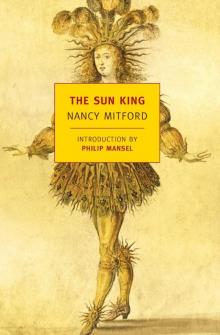 The Sun King
The Sun King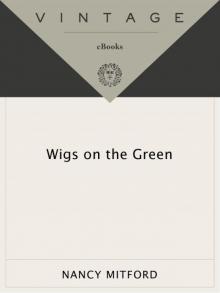 Wigs on the Green
Wigs on the Green Love in a Cold Climate
Love in a Cold Climate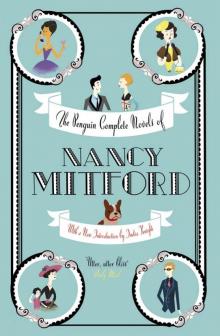 The Penguin Complete Novels of Nancy Mitford
The Penguin Complete Novels of Nancy Mitford The Pursuit of Love
The Pursuit of Love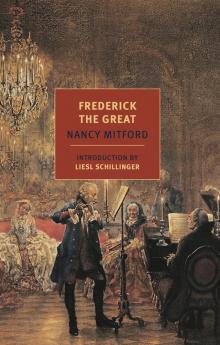 Frederick the Great
Frederick the Great Highland Fling
Highland Fling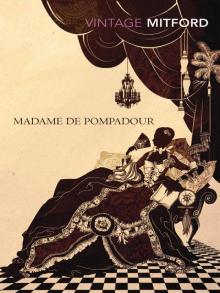 Madame de Pompadour
Madame de Pompadour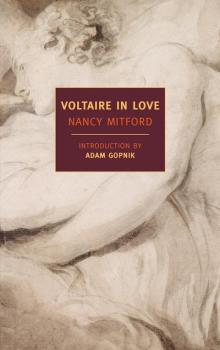 Voltaire in Love
Voltaire in Love Don't Tell Alfred
Don't Tell Alfred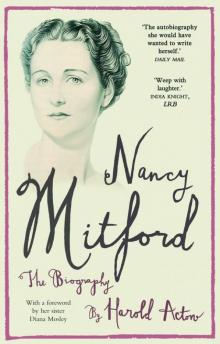 Nancy Mitford
Nancy Mitford Christmas Pudding and Pigeon Pie
Christmas Pudding and Pigeon Pie